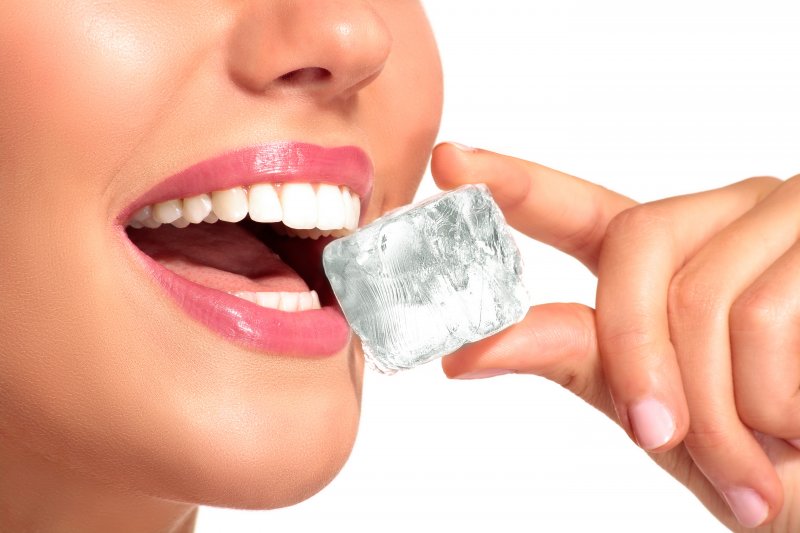
An ice-cold beverage is a refreshing way to cool down during the hot summer months. After finishing a drink, it’s common for people to mindlessly munch through their leftover ice cubes. Unfortunately, this habit is not as harmless as it seems. Chewing on ice can damage your teeth, enamel, and gums, leading to serious dental problems.
You’ve probably been told to break the habit for the sake of your oral health, but are you having a difficult time doing so? Read along to find out how eating ice can harm your smile and a few alternatives so you can safely get your fix.
Why Do People Chew on Ice?
Pica is the medical term for craving and chewing on items that have little or no nutritional value. A common form of this disorder is pagophagia, which is the compulsive consumption of ice or iced drinks. Compulsively eating ice is considered to be a symptom of iron deficiency anemia. The coolness of the crunchy cubes is suspected to soothe oral inflammations caused by iron deficiencies.
While some people have developed this habit because they’re iron deficient, others may do it merely out of boredom or as a form of stress relief.
Why Is Chewing on Ice Bad for Your Teeth?
Chewing on ice won’t inflict the same detrimental effects as other addictions, but it can still harm your oral health. It can cause cracked or chipped teeth, damage your enamel, and may even lead to problems with existing dental work like fillings and crowns. Dental damage can increase your risk of tooth sensitivity and leave your teeth more prone to decay and cavities.
Tips to Break Your Ice Chewing Habit
Are you struggling to curb the habit? Here are tips and tricks to help you out:
- Let it melt. Instead of eating ice cubes, let them slowly melt in your mouth. You’ll still enjoy a cool treat without harming your teeth. Plus, it will last longer!
- Go for a slushie instead. Replace regular ice cubes with finely shaven ice to satisfying your craving while reducing your risk of dental damage.
- Choose an alternative crunchy snack. If it’s the crunch you’re after, opt for an alternative snack that’s nice and crisp. Carrots, apples, cucumbers, and celery are healthy options to help you get your fix. They’re good for your teeth too!
- Search for an underlying cause. Do you find it absolutely impossible to resist the habit? Consult with your dentist to rule out any iron deficiencies. Iron supplements and other interventions are available for those who have anemia or pica.
As you can see, chewing on ice can create a slew of dental health problems. Use these tips to kick the habit so you can keep your smile happy and healthy for years to come.
About the Author
For decades, Dr. Hal M. Lippard has helped patients achieve healthier, happier smiles. He pursued his Doctor of Dental Surgery at the University of Tennessee College of Dentistry in Memphis and was awarded the Armed Forces Health Professions Scholarship. Are your teeth damaged as a result of chewing ice? Dr. Lippard offers emergency care so you can receive immediate treatment for your problems. If you need help breaking the habit, schedule an appointment via our website or call (434) 293-9311.